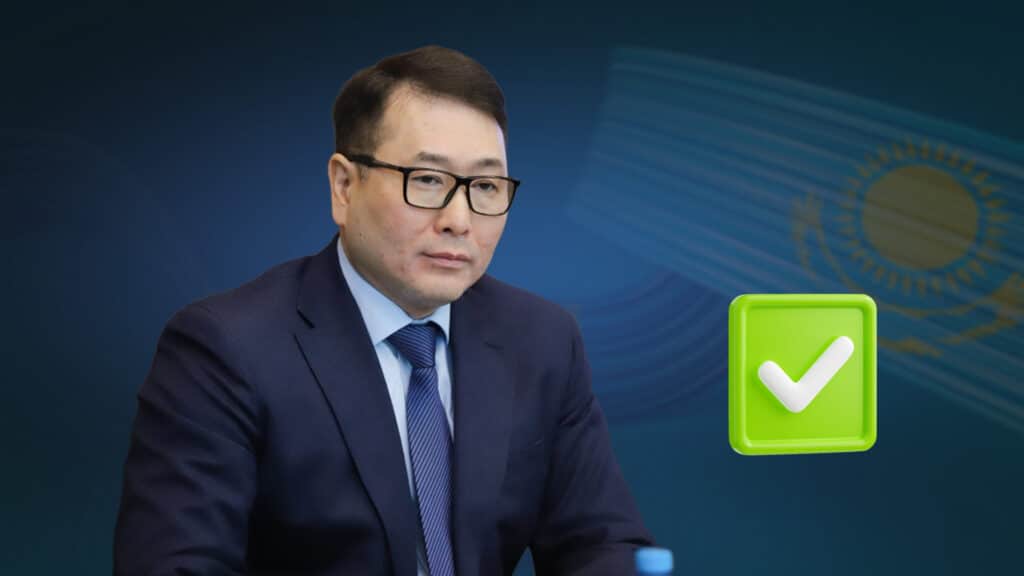Kazakhstan’s trade minister says that cooperation with the EU in sphere of sanctions is going well

According to Arman Shakkaliyev, minister of trade of Kazakhstan, there was not a single case of breaching sanctions imposed by the EU against Russia over the past six months.
As the official noted, when David O’Sullivan, International Special Envoy for the Implementation of EU Sanctions visited Astana in November 2023, he expressed his satisfaction with Kazakhstan’s cooperation in the sphere of export control and sanction regime against Russia.
How does export control work? According to Shakkaliyev, Kazakhstan and the EU regularly exchange information and adjust the list of goods subject to export control right after each change in sanction lists.
«The simple truth is that the companies that violated sanctions and were monitored by our Western partners are gone now. We haven’t seen any activity from them over the past six months. Indeed, they were involved in trade with those goods. We have never hidden that. However, as you probably know, our Western partners constantly amend these sanction lists. As a result, we do adjust such lists of goods subject to export control here in Kazakhstan as well,» the minister said on the sidelines of the Senate, the upper house of the country’s parliament.
How does the EU estimate cooperation with Kazakhstan? As Shakkaliyev highlighted, O’Sullivan has remained satisfied with Kazakhstan’s efforts in the sphere of export control. Moreover, Kazakhstan currently fully meets its international obligations as the number of goods subject to control exported from Kazakhstan is declining.
«We’ve seen this dynamic for almost all groups of goods. We are doing everything necessary. Both the Ministry of Finance and the Ministry of Industry have special commissions for this issue. This system has been built in a certain way to ensure that the country meets its obligations,» Shakkaliyev stated.
Last year, U.S. Ambassador to Kazakhstan Daniel Rosenblum said that U.S. sanctions could negatively affect the country’s economy and some of its businesses if they are imposed.
Kazakhstan and anti-Russian sanctions
In early October 2023, Kazakhstani MP Nikita Shatalov explained that Kazakhstan wants to protect its interests and continue to cooperate with both the West and Russia. However, Kazakhstan complies with anti-Russian sanctions to avoid secondary sanctions. At the same time, trade in usual goods between Kazakhstan and Russia is growing, the MP said.
In late September 2023, President Kassym-Jomart Tokayev responded to Russian propagandists blaming Kazakhstan for «flirtation» with the West by saying that Kazakhstan wants both sides to drop their sanction confrontation and highlighting that Kazakhstan will continue to cooperate with Russia.
According to Reuters and Bloomberg, citing people familiar with the matter, the 11th package of anti-Russian sanctions can also hit Kazakhstan. As Reuters wrote, new sanctions will prohibit the unloading of oil tankers in the open sea or staying in seaports with GPS trackers switched off. This rule is designed to prevent trade with oil from bypassing sanctions.
In June 2023, a small commercial bank told Vedomosti that Kazakhstani banks such as Halyk Bank, Fortebank, RBK Bank and Bereke Bank were refusing to accept payments in the Russian ruble. In turn, Minister of Finance Yerulan Zhamaubayev said the government had nothing to do with that.
Also, in the summer of 2023, many Kazakhstani banks started blocking payments for servers, chips, processors, telecommunication equipment and other electronic goods by Russian entities that were unwilling to deal with sanctions. These fears were directly related to a 10th package of U.S. sanctions that threatened banks cooperating with sanctioned individuals or entities in Russia.
Since the start of the war in Ukraine, Russia has been dealing with a wide range of sanctions imposed by the U.S., the EU, the U.K. and other countries against individuals, businesses and entire industries of the Russian economy. According to some data, Moscow has outranked Tehran and Pyongyang in terms of the number of imposed sanctions.
Russia launched its full-scale invasion of Ukraine to «demilitarize» and «denazify» this country on February 24, 2022. At the time, President Vladimir Putin recognized the independence of the so-called Donetsk and Luhansk People’s Republics, two breakaway regions of Ukraine.

